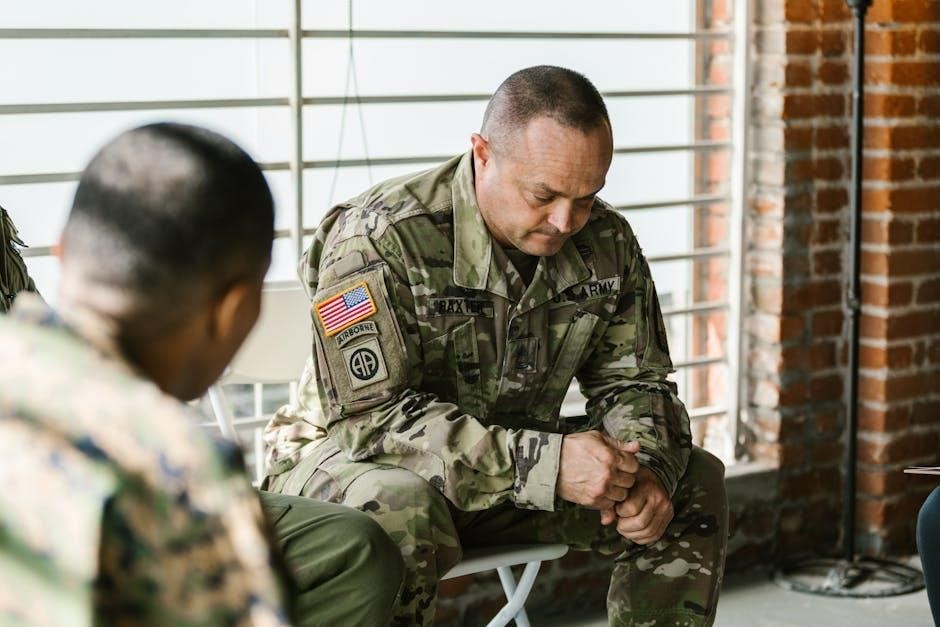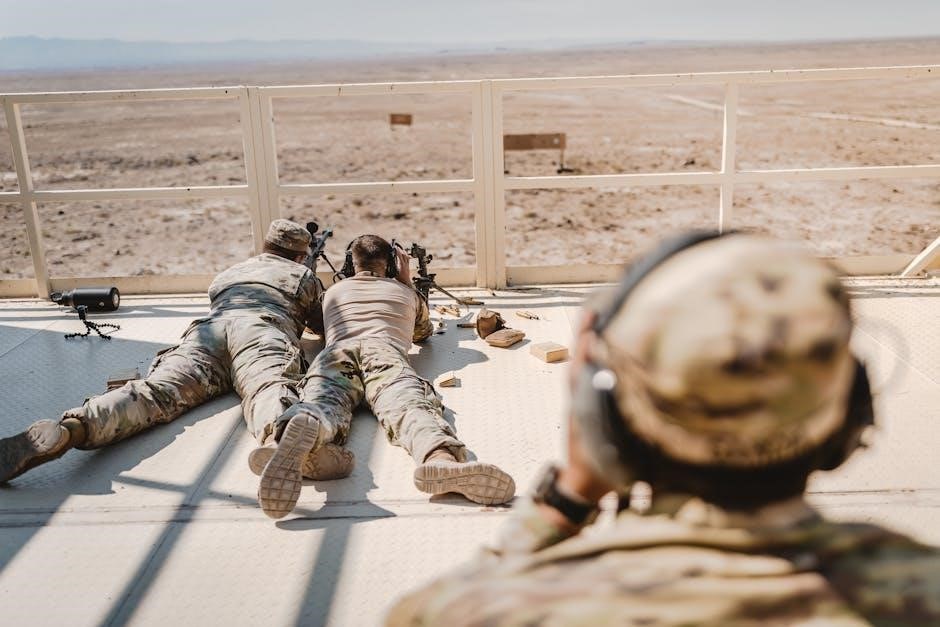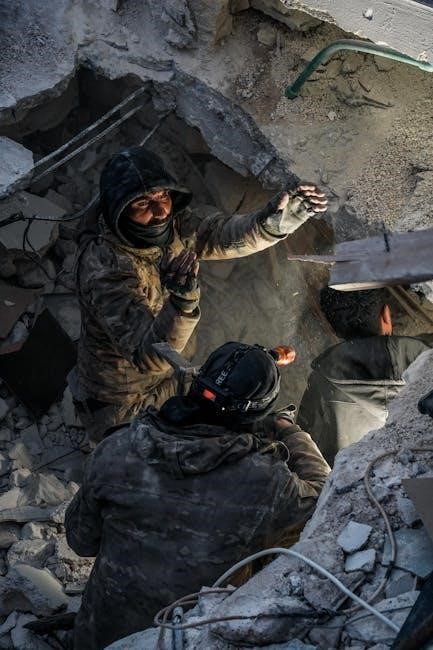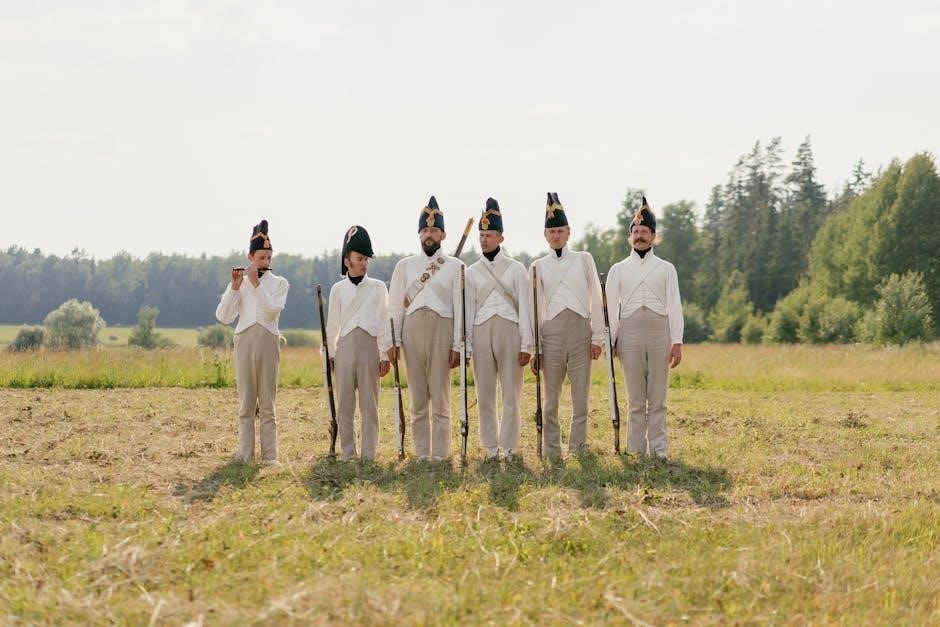The Soldier’s Creed is a foundational document outlining a soldier’s commitment to the U․S․ Army’s values and mission․ Available in PDF, it’s essential for training and personal guidance, reflecting the Army’s core principles and ethical standards․
1․1 Definition of the Soldier’s Creed
The Soldier’s Creed is a solemn promise and statement of commitment made by U․S․ Army soldiers․ It defines their identity, values, and responsibilities as members of the military․ The Creed emphasizes loyalty, duty, respect, selfless service, honor, integrity, and personal courage․ It serves as a guiding principle for soldiers, outlining their dedication to the mission, their fellow soldiers, and the nation․ The Creed is often recited during ceremonies and training to reinforce these values․ Available in PDF format, it is widely used for education and memorization, ensuring soldiers internalize its principles․ The Soldier’s Creed is not just a statement—it is a way of life that shapes a soldier’s behavior and decision-making, both on and off duty․
1․2 Historical Background of the Soldier’s Creed
The Soldier’s Creed was formally introduced in 2003 as part of the U․S․ Army’s initiative to reaffirm its values and ethos․ It was developed to inspire soldiers and remind them of their commitment to the nation, the Army, and their fellow soldiers․ The Creed reflects the Army’s rich history and the principles that have guided soldiers through generations․ It emphasizes loyalty, duty, respect, and selfless service, among other core values․ The Creed is deeply rooted in the Army’s tradition of honor and integrity, serving as a unifying statement for all soldiers․ Its creation marked a significant effort to strengthen the moral and ethical foundation of the military․ Today, the Soldier’s Creed is widely recognized and is often recited during training, ceremonies, and other official events․ It is also available in PDF format for easy access and reference․
1․3 Key Principles of the Soldier’s Creed
The Soldier’s Creed outlines core principles that guide a soldier’s conduct and mindset․ It emphasizes placing the mission first, never accepting defeat, and never quitting․ Soldiers are committed to leaving no fallen comrade behind, reflecting teamwork and loyalty․ The Creed also highlights discipline, both physical and mental, as essential traits․ It underscores the importance of living the Army Values, such as loyalty, duty, respect, selfless service, honor, integrity, and personal courage․ These principles foster a sense of responsibility, accountability, and unity among soldiers․ The Creed serves as a moral compass, inspiring soldiers to uphold the highest standards of professionalism and ethics․ By adhering to these principles, soldiers embody the Warrior Ethos and contribute to the Army’s mission and legacy․ The Creed’s principles are integral to a soldier’s identity and are often referenced in training and daily operations․ They are also readily available in PDF format for easy access and study․

The Army Values
The Army Values, outlined in the Soldier’s Creed PDF, include Loyalty, Duty, Respect, Selfless Service, Honor, Integrity, and Personal Courage, guiding soldiers’ conduct and decisions․
2․1 Loyalty
Loyalty is a cornerstone of the Army Values, as emphasized in the Soldier’s Creed PDF․ It represents unwavering devotion to the nation, the Army, and fellow soldiers․ Loyalty is demonstrated through actions and decisions that prioritize the greater good over personal interests․ Soldiers are expected to uphold their oaths, stand by their comrades, and remain committed to the mission․ This value fosters trust, unity, and esprit de corps within the ranks․ By living with loyalty, soldiers ensure the strength and cohesion of their teams, reflecting the Army’s commitment to shared purpose and mutual support․ The Soldier’s Creed PDF underscores loyalty as a fundamental principle guiding soldiers’ conduct and dedication to their duties․ It is through loyalty that soldiers honor their obligations and contribute to the success of the mission․
2․2 Duty
Duty is a fundamental principle of the Soldier’s Creed, as outlined in the PDF․ It represents a soldier’s commitment to fulfilling their responsibilities with dedication and accountability․ Duty is about taking pride in one’s work, upholding the Army’s standards, and contributing to the mission’s success․ Soldiers are expected to carry out their tasks with integrity, ensuring the safety and effectiveness of their team․ The Soldier’s Creed PDF emphasizes that duty is not just a obligation but a way of life, reflecting a soldier’s loyalty to their country and fellow service members․ By embracing duty, soldiers demonstrate their unwavering commitment to the Army’s values and the nation they serve․ This principle is central to the Creed, guiding soldiers to act with purpose and honor in all their endeavors․
2․3 Respect
Respect is a cornerstone of the Soldier’s Creed, as highlighted in the PDF․ It emphasizes treating others with dignity and courtesy, fostering a culture of unity and mutual trust․ Soldiers are expected to respect fellow service members, superiors, and subordinates, regardless of rank or position․ This principle extends to civilians and the communities they serve․ The Creed underscores that respect is essential for maintaining discipline, teamwork, and morale․ By upholding respect, soldiers promote a positive and inclusive environment, reflecting the Army’s commitment to diversity and equality․ The Soldier’s Creed PDF serves as a reminder that respect is not just a value but a fundamental aspect of military professionalism, ensuring that soldiers act with compassion and fairness in all interactions․ This principle strengthens the bond within the Army and reinforces its mission to protect and serve with honor․ Respect is vital to the Army’s identity and operational success․
2․4 Selfless Service
Selfless service, as outlined in the Soldier’s Creed PDF, is the commitment to put the needs of the mission and others before one’s own․ It embodies the Army’s values by prioritizing teamwork and collective success over personal gain․ Soldiers are expected to sacrifice their comfort and interests for the greater good, demonstrating unwavering dedication to their unit and country․ This principle fosters unity and trust within the team, ensuring that every member contributes to achieving the mission․ The Creed emphasizes that selfless service is not just a duty but a moral obligation, reflecting the Army’s ethos of shared responsibility and mutual support․ By embracing selfless service, soldiers uphold the highest standards of military professionalism and honor, ensuring the success of their mission and the well-being of their comrades․ This value is central to the Soldier’s Creed and is deeply ingrained in Army culture․ It inspires soldiers to act with humility and devotion․
2․5 Honor
Honor is a cornerstone of the Soldier’s Creed, reflecting the moral and ethical standards expected of every service member․ It demands integrity, honesty, and accountability in all actions, both on and off duty․ Soldiers are expected to uphold their personal and professional reputation, ensuring their conduct aligns with the Army’s values․ Honor is not just a principle but a way of life, guiding soldiers to act with ethical behavior and respect for others․ It fosters trust and credibility within the unit and with the public․ By living with honor, soldiers demonstrate their commitment to the Army’s legacy and the nation they serve․ The Soldier’s Creed PDF emphasizes that honor is essential for maintaining the dignity of the uniform and the integrity of the mission․ It is a value that defines a soldier’s character and shapes their decisions in every situation․ Honor is non-negotiable and fundamental to military service․
2․6 Integrity
Integrity is a fundamental value in the Soldier’s Creed, representing the moral compass that guides a soldier’s actions and decisions․ It demands honesty, transparency, and adherence to ethical principles, both on and off duty․ Soldiers with integrity act in accordance with their conscience and the Army’s ethical standards, even when no one is watching․ This value fosters trust and credibility within the unit and with the public․ Integrity ensures that soldiers uphold the Army’s reputation and maintain their personal and professional character․ The Soldier’s Creed PDF emphasizes that integrity is non-negotiable and essential for building a strong, cohesive team․ It requires soldiers to be truthful and consistent in their words and actions, aligning their behavior with the Army’s values and mission․ By living with integrity, soldiers demonstrate their commitment to excellence and moral authority․ Integrity is the foundation of a soldier’s identity and professional conduct․ It is vital for maintaining trust and achieving mission success․
2․7 Personal Courage
Personal courage is a cornerstone of the Soldier’s Creed, embodying the resilience and determination required to face challenges and overcome fear․ It involves both physical and moral bravery, enabling soldiers to stand firm in the face of adversity․ The Soldier’s Creed PDF highlights that personal courage is not the absence of fear but the willingness to act despite it․ Soldiers are expected to confront difficult situations with confidence and perseverance, whether in combat or during everyday duties․ This value ensures that soldiers remain steadfast in their commitment to the mission and their comrades․ Personal courage fosters a culture of strength and reliability within the Army, allowing soldiers to inspire others and lead by example․ It is through personal courage that soldiers uphold the Army’s legacy of valor and selflessness, ensuring the success of their team and the fulfillment of their duty․ Personal courage is essential for building a resilient and formidable force․

The Warrior Ethos
The Warrior Ethos is a set of principles guiding soldiers, emphasizing courage, loyalty, and perseverance․ It is embedded in the Soldier’s Creed, available in PDF for easy access and study․
3․1 Definition of the Warrior Ethos
The Warrior Ethos is a set of core principles that define a soldier’s identity and behavior․ It emphasizes perseverance, loyalty, and courage, even in the face of adversity․ Rooted in the Soldier’s Creed, the Warrior Ethos underscores the commitment to the mission, fellow soldiers, and the nation․ It serves as a moral and ethical guide, ensuring soldiers adhere to the Army’s values and standards․ The ethos is deeply ingrained in training and daily operations, fostering resilience and teamwork․ Available in PDF formats, the Soldier’s Creed and Warrior Ethos provide soldiers with a clear framework for conduct and decision-making, both on and off the battlefield․
3․2 The Role of the Warrior Ethos
The Warrior Ethos plays a pivotal role in shaping a soldier’s mindset and behavior․ It serves as a moral and ethical foundation, guiding soldiers to uphold the Army’s values and principles․ The ethos emphasizes the importance of teamwork, resilience, and selflessness, ensuring soldiers remain committed to their mission and comrades․ It fosters a culture of accountability and unity, reinforcing the belief that no soldier should ever be left behind․ By integrating the Warrior Ethos into training and daily operations, soldiers are prepared to face challenges with courage and determination․ This mindset is further reinforced through the Soldier’s Creed, which is widely available in PDF formats for easy access and study, ensuring its principles are deeply ingrained in every soldier’s conduct and decision-making process․
3․3 Key Tenets of the Warrior Ethos
The Warrior Ethos is built on several core principles that define a soldier’s identity and behavior․ These tenets include placing the mission first, never accepting defeat, and refusing to quit under any circumstances․ Additionally, the ethos emphasizes the sacred duty of never leaving a fallen comrade behind, fostering a deep sense of loyalty and teamwork; It also underscores the importance of personal courage, both physical and moral, to stand firm in the face of adversity․ These principles are ingrained in the Soldier’s Creed, which is widely available in PDF format for easy access and study․ By adhering to these tenets, soldiers embody the resilience, discipline, and honor that define the U․S․ Army’s warrior culture, ensuring they remain steadfast in their commitment to the mission and their fellow soldiers․

The Soldier’s Creed in PDF Format
The Soldier’s Creed is widely available in PDF format, accessible via official Army websites and training materials․ It serves as a handy resource for study, memorization, and educational purposes․
4․1 Availability and Download of the Soldier’s Creed PDF
The Soldier’s Creed is readily available in PDF format, accessible through official U․S․ Army websites, training manuals, and educational resources․ Soldiers and civilians can easily download it from platforms like the Department of the Army’s official website or Army ROTC resources․ The PDF version is often accompanied by practice guides and memorization tips, making it a valuable tool for training and personal study․ Additionally, websites like army․mil offer direct links to the PDF, ensuring quick and secure access․ The file is typically lightweight, with sizes ranging from 161 KB to 326 KB, making it easy to download on any device․ Its widespread availability ensures that soldiers can conveniently access and study the Creed, reinforcing their commitment to the Army’s values and mission․
4․2 Importance of the PDF Version
The PDF version of the Soldier’s Creed holds significant importance as it provides a standardized and easily accessible format for soldiers to study and reference․ Its portability allows soldiers to carry the Creed on personal devices, ensuring constant availability for review and memorization․ The PDF format preserves the document’s layout and integrity, making it ideal for printing and distribution during training sessions; Additionally, the PDF is often used in educational materials, promoting uniform understanding of the Army’s values and principles․ Its digital nature also supports quick updates, ensuring soldiers always have the most current version․ Overall, the PDF version serves as a vital tool for reinforcing the Creed’s principles and fostering a unified military culture․
4․3 Uses in Training and Education
The Soldier’s Creed PDF is widely utilized in military training and education to instill the Army’s core values and principles․ It is integrated into training manuals and study guides, providing soldiers with a clear and concise reference for understanding their responsibilities and ethical standards․ The PDF format is particularly useful for distributing the Creed during basic training, where it serves as a foundational document for new recruits․ Additionally, it is often used in leadership development programs to emphasize the importance of honor, integrity, and personal courage․ The Creed is also incorporated into promotion boards and competitions, where soldiers are expected to demonstrate their knowledge and commitment to its principles․ By making the Creed easily accessible in a digital format, the Army ensures that soldiers can study and reflect on its teachings at any time, reinforcing their dedication to the mission and their fellow comrades․

Memorization and Recitation
Memorizing the Soldier’s Creed is crucial for reinforcing a soldier’s commitment to the Army’s values and mission․ Recitation during ceremonies strengthens unity and reflects unwavering dedication to the Creed’s principles․
5․1 Importance of Memorization
Memorizing the Soldier’s Creed is essential for reinforcing a soldier’s commitment to the Army’s values and mission․ It fosters unity and ensures all soldiers share a common foundation of principles․ The Creed, available in PDF, serves as a constant reminder of a soldier’s duties and ethical standards․ By committing it to memory, soldiers internalize the Army’s core values, such as loyalty, duty, and respect, which guide their actions in all situations․ Memorization also enhances recitation during ceremonies and training, strengthening camaraderie and shared identity․ It prepares soldiers to uphold the Creed’s principles under pressure, ensuring they remain disciplined and focused on their mission․ Ultimately, memorization is a vital step in developing the mindset required to serve with honor and integrity․
5․2 Tips for Effective Memorization
Effective memorization of the Soldier’s Creed requires consistent practice and strategic techniques․ Start by breaking the Creed into smaller sections, focusing on one phrase at a time․ Repetition is key—recite the Creed daily, either aloud or silently, to reinforce memory․ Use visualization techniques to associate phrases with mental images of Army values and missions․ Practice in front of a mirror to improve confidence and delivery․ Utilize flashcards with key phrases on one side and their meanings on the other․ Recording and listening to the Creed can also aid retention․ Incorporate physical activity, such as marching, while reciting to enhance focus․ Group study with fellow soldiers fosters accountability and teamwork․ Finally, set specific goals, like mastering one section per day, to track progress․ These methods ensure the Creed becomes ingrained in both mind and heart, preparing soldiers for ceremonies and real-world applications․
5․3 Role in Military Ceremonies
The Soldier’s Creed plays a pivotal role in military ceremonies, serving as a unifying statement of commitment and values․ It is often recited during events such as basic training graduations, promotions, and change-of-command ceremonies․ The Creed’s recitation reinforces the Army’s ethical foundation and strengthens camaraderie among soldiers․ In ceremonies, it is typically delivered collectively, symbolizing unity and shared purpose․ The Creed’s inclusion in PDF formats ensures its widespread availability for use in these events, making it easily accessible for practice and display․ Its presence in ceremonies underscores its importance as a motivational tool, inspiring soldiers to uphold the Army’s values and mission․ By integrating the Creed into formal proceedings, the Army fosters a culture of accountability, honor, and resilience, ensuring its principles endure across generations of service members․

The Role of the Soldier’s Creed in Military Culture
The Soldier’s Creed is central to military culture, shaping soldiers’ mindsets, guiding training, and inspiring leadership․ Its PDF availability ensures accessibility, reinforcing Army values and unity․
6․1 Impact on Soldier’s Mindset
The Soldier’s Creed profoundly shapes a soldier’s mindset by instilling a strong sense of identity, purpose, and belonging․ It emphasizes loyalty, duty, and selfless service, fostering resilience and discipline․ The Creed’s principles, such as never quitting or leaving a fallen comrade, create a shared ethos that strengthens unity and accountability․ Soldiers internalize these values, which guide their decisions and actions, both on and off the battlefield․ The availability of the Soldier’s Creed in PDF format ensures easy access for study and memorization, reinforcing its teachings․ By living the Creed, soldiers develop a mindset rooted in honor, integrity, and personal courage, which are essential for overcoming challenges and upholding the Army’s legacy․ This mental foundation is critical for building a cohesive, mission-focused force dedicated to serving the nation․
6․2 Use in Training and Indoctrination
The Soldier’s Creed plays a pivotal role in military training and indoctrination, serving as a cornerstone for instilling Army values and ethical standards․ Recruits and soldiers are encouraged to memorize and recite the Creed, fostering a shared identity and commitment to the mission․ Training programs often integrate the Creed into daily routines, using it to reinforce principles like loyalty, duty, and personal courage․ The availability of the Soldier’s Creed in PDF format makes it easily accessible for distribution and study, ensuring that all personnel can reference it during training sessions․ This consistent exposure helps soldiers internalize the Creed’s message, aligning their actions with the Army’s expectations․ By embedding the Creed into training, the military cultivates a culture of discipline, unity, and resilience, preparing soldiers to uphold the highest standards of service and conduct․

6․3 Role in Leadership Development
The Soldier’s Creed is instrumental in shaping leaders within the military, emphasizing the importance of integrity, honor, and selfless service․ Leaders use the Creed to set a moral and ethical example, fostering a culture of accountability and discipline․ By internalizing the Creed’s principles, leaders develop the resilience and courage needed to make tough decisions under pressure․ The Creed also encourages leaders to prioritize the mission and their team, promoting a mindset of collective responsibility․ As a readily available resource in PDF format, the Soldier’s Creed serves as a constant reminder of the leadership qualities expected in the Army․ It helps leaders connect with their soldiers on a personal level, inspiring trust and unity․ Through the Creed, leaders are empowered to embody the Army’s values, ensuring they lead with purpose, integrity, and a commitment to excellence․
The Soldier’s Creed stands as a cornerstone of military identity, guiding soldiers in their commitment to the Army’s values and mission․ Its principles of loyalty, duty, and respect shape the mindset of service members, fostering a culture of integrity and personal courage․ Available in PDF format, the Creed is a vital resource for training, education, and personal reflection․ It serves as a unifying force, reminding soldiers of their role in protecting freedom and upholding the nation’s trust․ By embodying the Creed, soldiers demonstrate their dedication to the mission and their fellow comrades․ Its influence extends beyond individual service, contributing to the broader ethos of military leadership and the collective pursuit of excellence․ The Soldier’s Creed remains an enduring symbol of the Army’s values, inspiring soldiers to uphold the highest standards of service and honor․